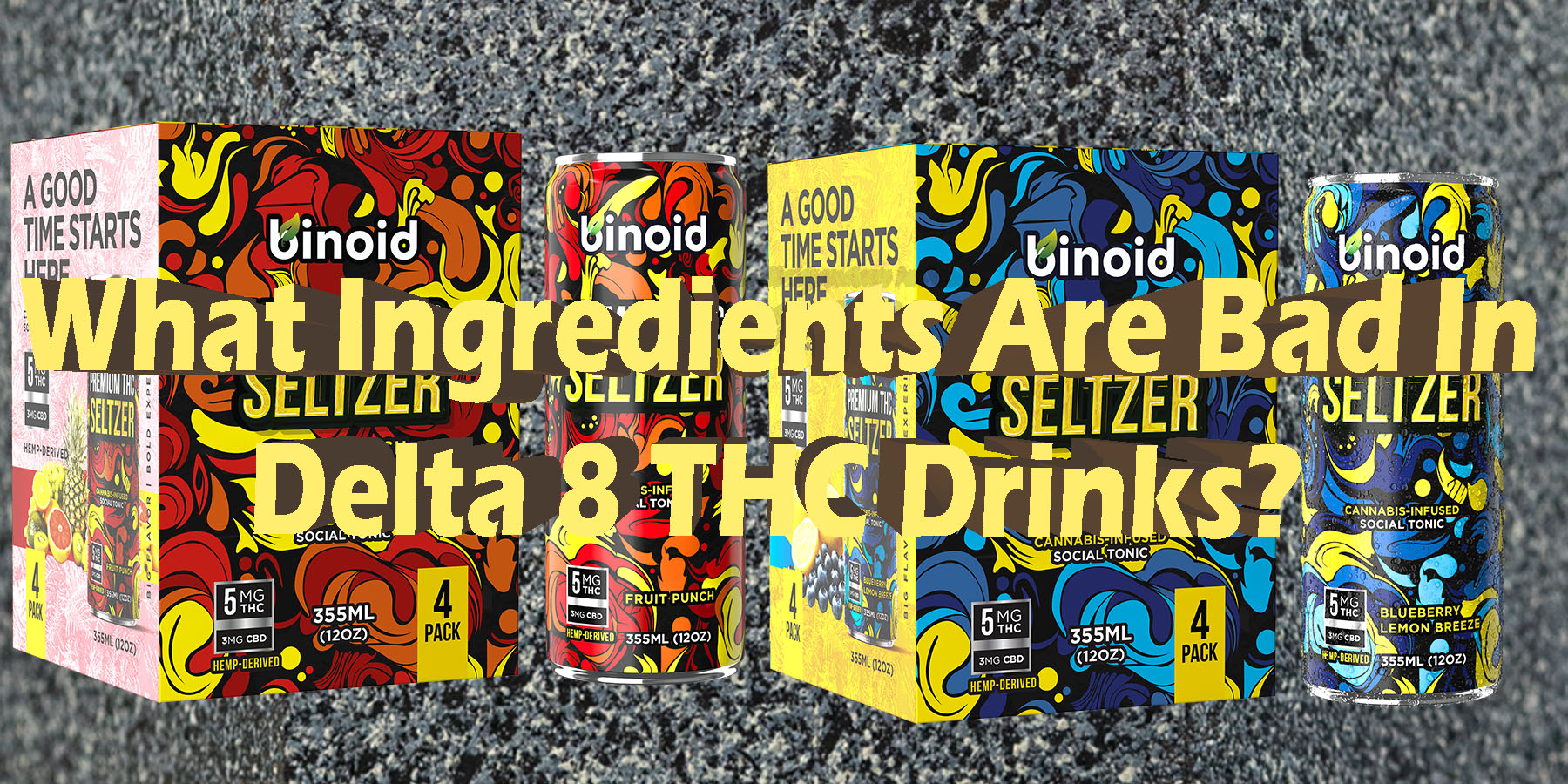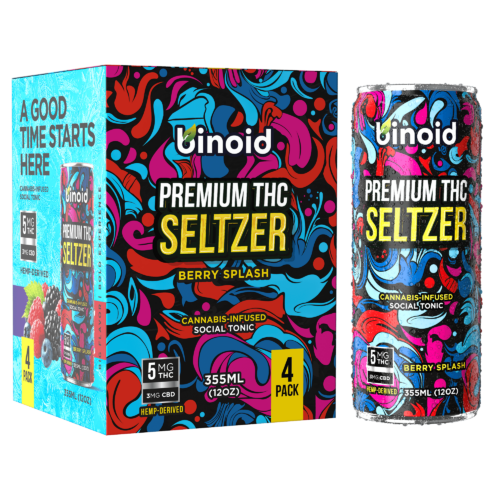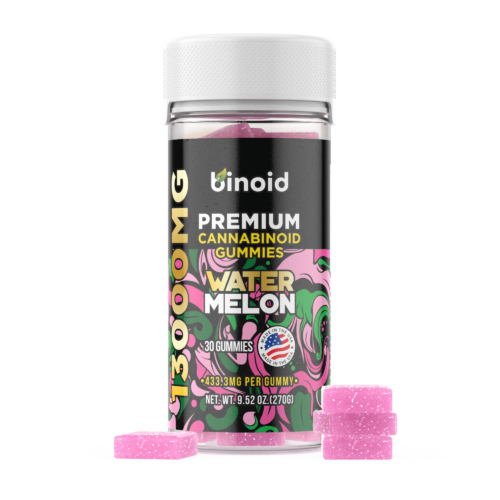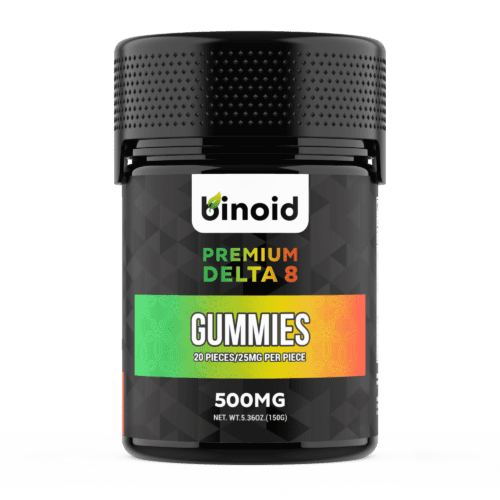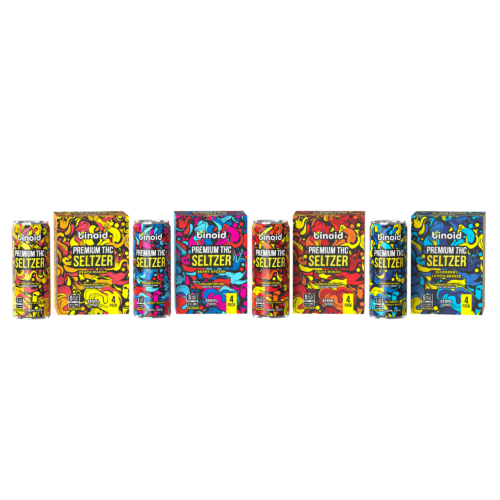In our modern age of conscious consumption, we’ve rightfully become vigilant gatekeepers of our own bodies, armed with a healthy skepticism and a desire for absolute transparency. We have learned to meticulously scan nutrition labels on our food, question the origins of our daily supplements, and lend our loyalty only to the brands that earn our trust through honesty.
As the vibrant and rapidly expanding universe of hemp-derived cannabinoid beverages continues to flourish with exciting new options, it is only natural and indeed necessary that we turn this same discerning eye toward the liquids we select for our moments of leisure and relaxation. The journey toward a clear-headed, blissful state of mind should be paved with clean, high-quality ingredients, yet the reality of the bustling Delta 8 THC market is that not all drinks are created equal.
Beyond the enticing promises of euphoria and calm on the front of the can lies the ingredient list—the true, unvarnished story of a beverage’s character and a brand’s integrity. Learning to decode this list is a profound act of self-advocacy, transforming you from a passive consumer into an empowered architect of your own well-being.
To Buy Delta 8 THC Drinks Click Here
Recommended products
What are Delta 8 THC Drinks?
Prior to starting our forensic examination of the ingredient label, it is essential to establish a clear and solid understanding of these unique beverages. At its most fundamental level, a Delta 8 THC drink is a ready-to-consume beverage that has been infused with a precise, measured dose of Delta 8 Tetrahydrocannabinol – a fascinating cannabinoid found in the cannabis plant that’s an isomer of the more famous Delta 9 THC; while they share the same chemical formula, a subtle difference in their molecular structure leads to Delta 8 producing effects that are widely described as being more clear-headed, less anxious, and more body-focused.
Since Delta 8 occurs naturally in only trace amounts, the cannabinoid used in these drinks is typically created by chemically converting hemp-derived CBD, a legal distinction that has made these products widely accessible. These drinks are specifically engineered to be approachable, socially integrated, and remarkably convenient, presenting the unique effects of Delta 8 in a familiar and socially acceptable format. The true innovation that underpins this entire product category lies in the sophisticated food science that allows the naturally oil-based Delta 8 THC to be seamlessly blended into water-based liquids.
This is achieved through a high-tech process known as Nanoemulsion, which shatters cannabis oil into microscopic particles that can be evenly dispersed and remain stable in liquid. This crucial step ensures a consistent, shelf-stable, and enjoyable product where every sip delivers a predictable portion of the active ingredient. This scientific leap has opened the floodgates for innovation, creating a vibrant and diverse marketplace of options where nearly every preference and occasion is catered to.
The creation of these beverages hinges on that core science of emulsification, which transforms a refined Delta 8 THC distillate into a perfectly water-soluble component, unlocking a world of culinary possibilities for producers. Hence, the types of Delta 8 THC drinks you will commonly encounter on shelves and online storefronts are incredibly varied:
Delta 8 THC Seltzers: This category is arguably the most popular, defined by its minimalist ingredient profile and its appeal to the modern wellness-conscious consumer. The foundation of a premium Delta 8 seltzer is purified, crisp carbonated water. The manufacturing process involves infusing this bubbly water with a precisely dosed nano-emulsified Delta 8 THC distillate, which is critical for ensuring a perfectly clear appearance and avoiding any oily residue. The light, refreshing taste is typically derived not from sugar, but from natural fruit essences or botanical extracts like grapefruit, raspberry, or lime, resulting in a low-calorie, clean-finishing beverage.
Delta 8 THC Sodas: These beverages are intentionally designed to replicate the indulgent, sweet, and nostalgic experience of classic carbonated soft drinks. The process begins with the creation of a complex syrup base, which consists of water, a significant amount of a sweetening agent (from cane sugar to zero-calorie alternatives), and a proprietary blend of flavorings designed to mimic iconic tastes like cream soda or orange Fanta. A measured dose of emulsified Delta 8 THC is then infused into this base before the entire mixture is carbonated and packaged, often using retro-style branding on cans or glass bottles.
Delta 8 THC Waters: Crafted for the ultimate purist, Delta 8-infused waters are laser-focused on clean hydration and the most straightforward, unadulterated delivery of the cannabinoid possible. This category typically boasts the shortest ingredient list of all, often containing just purified, distilled, or mineral-rich spring water and a completely tasteless, colorless, and odorless water-soluble Delta 8 THC isolate or distillate. Most varieties proudly contain zero sugar, zero calories, and no additional flavors, though some may feature an extremely subtle hint of a natural fruit essence for a touch of character.
Delta 8 THC Lemonade: A beloved classic, this non-carbonated beverage is created from a simple base of lemon juice, water, and a sweetening agent. Production involves creating large, carefully controlled batches of lemonade, where the delicate balance between tartness and sweetness is paramount. A water-soluble Delta 8 THC emulsion is then thoroughly blended into the batch to guarantee an even and consistent distribution of the active ingredient throughout the entire volume of liquid. The type of sweetener used is a key variable, ranging from traditional cane sugar to natural alternatives like agave or monk fruit.
Delta 8 THC Tea: This diverse category includes both ready-to-drink (RTD) iced teas and, less commonly, traditional tea bags intended for home brewing. For the popular RTD versions, large quantities of black, green, or herbal tea are brewed using real tea leaves, which are then cooled and often sweetened. A Delta 8 THC extract is then emulsified and mixed into the finished tea before it is pasteurized and packaged in bottles or cans for shelf stability.
Delta 8 THC Coffee: Offering a unique and synergistic experience, Delta 8 coffee caters to those looking to combine the energizing buzz of caffeine with the calm, clear-headed focus of Delta 8. The most common method for ready-to-drink products involves brewing large batches of coffee, often as a cold brew to ensure a smoother, less acidic taste. A liquid Delta 8 THC emulsion is then blended into the finished coffee before it is canned or bottled, sometimes with the addition of milk, sugar, or other flavorings.
Delta 8 THC Cocktails: Also known as “mocktails,” these are sophisticated, non-alcoholic beverages meticulously designed to replicate the complex and layered taste profiles of traditional craft cocktails. Their creation is a masterful exercise in modern mixology, involving the careful balancing of flavors from natural fruit juices, botanical extracts, aromatic bitters, and exotic spices. A precisely measured dose of Delta 8 THC emulsion is then infused into this intricate, non-alcoholic base, and the final product is often packaged in smaller, single-serving cans that reflect its premium, adult positioning.
Delta 8 THC Drink Mix: This product category is all about on-the-go convenience and discretion, consisting of a dehydrated powder or a liquid concentrate designed to be added to any beverage. To create the powder, a THC nano-emulsion is typically bonded to a carrier powder like tapioca maltodextrin and then spray-dried. This is then mixed with crystalline flavors, sweeteners, and anti-caking agents. Liquid concentrates are essentially shelf-stable, concentrated Delta 8 emulsions with added preservatives and flavors. The ingredient lists for these mixes can be quite long, making them a crucial category for label-conscious consumers to scrutinize.
The effects of a Delta 8 THC drinks are largely defined by their rapid onset and manageable duration, which stand in contrast to traditional edibles. Thanks to the use of Nanoemulsion technology, the Delta 8 can be absorbed by the body much more quickly, with many users reporting an onset of effects in as little as 10 to 20 minutes. This quick feedback loop is a critical feature, as it allows a user to better assess the effects in real-time and avoid the common pitfall of overconsumption associated with slow-acting edibles. The duration of the effects is also often shorter, making for a more controllable journey that doesn’t monopolize an entire day.
The audience for Delta 8 THC drinks is remarkably diverse and continues to expand as the perception of hemp-derived cannabinoids evolves. A major segment of this audience includes individuals actively seeking enjoyable alternatives to alcohol, drawn to the ability to participate in social rituals with a beverage that provides a pleasant buzz without the well-known downsides of alcohol. Another significant group is composed of wellness-minded consumers who value the smoke-free nature of the product and actively seek out options that are low in sugar, low in calories, and made with all-natural ingredients. This also includes a large and growing number of “canna-curious” newcomers, who find the familiar, controlled, and discreet format of a beverage to be a much less intimidating entry point into the world of cannabinoids than other, more traditional methods.
Recommended products
Why Ingredients are Chosen (or Not) in Delta 8 THC Drinks?
Navigating the world of Delta 8 THC drinks with a health-conscious and safety-first mindset requires you to become a proficient and critical reader of ingredient labels. While the vibrant, flashy packaging on the front of the can might promise a clean, blissful, and clarifying experience, it is the fine print on the back that tells the real, unvarnished story of the product’s quality and the manufacturer’s integrity. The overall quality of a beverage is not just determined by the potency or purity of the Delta 8 it contains, but by the quality and intentionality of every single other component that goes into the final formulation.
You see, ingredients in Delta 8 drinks are carefully selected by reputable manufacturers for a variety of critical reasons, primarily to ensure product stability, deliver consistent and accurate dosing, and create an enjoyable and palatable consumer experience. Water-soluble cannabinoid emulsions, as we’ve discussed, are absolutely essential because they allow the Delta 8 to evenly disperse in the liquid, which is the only way to guarantee a predictable effect in every sip and prevent the oil from separating into an unpleasant, inconsistent mess. Natural and sometimes artificial flavorings and sweeteners are then incorporated to mask the often bitter and earthy taste of raw cannabis extracts, making the drink not just effective, but genuinely tasty and refreshing.
Conversely, certain ingredients are actively avoided by high-quality producers because they are markers of a low-quality or even unsafe product. For instance, non-emulsified oils are never used in a ready-to-drink beverage as they would lead to dramatically inconsistent dosing and a greasy, unpleasant texture. More importantly, contaminants like heavy metals, pesticides, or residual solvents from the extraction and conversion process must be strictly excluded, a guarantee that can only be provided through rigorous, full-panel, third-party lab testing. The overarching goal of a conscientious brand is to create a safe, stable, effective, and appealing alternative to traditional consumption methods, and the ingredient list is their primary testament to that commitment.
A List of Ingredients to Steer Clear of in Delta 8 THC Drinks
While the world of Delta 8 offers exciting new avenues for relaxation and enjoyment, it is also a largely unregulated frontier. Many mass-produced beverages, particularly those found in less-reputable venues like gas stations or smoke shops, can contain a host of artificial additives, excessive sugars, and chemical preservatives that a discerning, health-aware consumer would rightfully prefer to avoid. Being able to confidently identify these less-desirable ingredients on a label is a crucial skill that allows you to make purchasing choices that align with your personal wellness goals and values.
This vigilance ensures that your path to relaxation and a clear-headed buzz isn’t inadvertently paved with unnecessary or unwanted artificial compounds. The following chart details some of the most common ingredients you might want to steer clear of when selecting your next Delta 8 THC drink, empowering you to make the most informed choice possible.
|
Ingredient to Avoid |
Why You Might Steer Clear of It |
Commonly Found In |
|---|---|---|
|
High-Fructose Corn Syrup (HFCS) |
A highly processed, artificial sweetener derived from corn starch. Many health-conscious consumers actively avoid HFCS due to its association with various negative health outcomes in numerous studies on mainstream foods. In the context of a wellness-oriented beverage, its presence is often seen as a significant red flag indicating a lower-quality, mass-produced product that prioritizes low cost over health. |
THC Sodas, some mass-market THC Lemonades and Iced Teas. |
|
Artificial Sweeteners (Aspartame, Sucralose, Acesulfame Potassium) |
These are zero-calorie, synthetic sugar substitutes. While approved for consumption by regulatory bodies, some individuals report experiencing adverse reactions such as headaches, digestive discomfort, or an unpleasant chemical aftertaste. Given the ongoing consumer debate about their potential long-term health effects, many people prefer beverages sweetened with natural, plant-derived alternatives. |
“Zero Sugar” or “Diet” THC Sodas, many THC Drink Mixes, and some lower-quality flavored THC Waters. |
|
Artificial Colors (e.g., Red 40, Yellow 5, Blue 1) |
These dyes are petroleum-derived synthetic additives used for purely cosmetic purposes to give beverages a vibrant, consistent, and often unnatural color. They provide no nutritional value or flavor. Some studies have linked certain artificial colors to adverse reactions, particularly in sensitive individuals and children, leading many consumers to seek out products that are either clear or colored naturally with fruit and vegetable extracts. |
Brightly colored THC Sodas, neon-hued THC Cocktails, and many powdered THC Drink Mixes. |
|
Artificial Flavors |
These are complex, chemically derived flavorings designed in a lab to mimic natural tastes. The simple term “artificial flavors” on a label can conceal a proprietary blend of dozens of different chemicals. Consumers who prioritize a natural, whole-food-based diet often choose to avoid these in favor of products flavored with real fruit juices, purees, or natural botanical extracts for a cleaner and more authentic taste profile. |
Most lower-quality THC Sodas, some THC Cocktails, many THC Drink Mixes, and some lower-tier Seltzers. |
|
Chemical Preservatives (e.g., Sodium Benzoate, Potassium Sorbate) |
These are chemicals added to beverages to dramatically prolong shelf life by preventing the growth of mold, yeast, and bacteria. When combined with ascorbic acid (Vitamin C) under certain conditions, sodium benzoate can form small amounts of benzene, a known carcinogen. While levels in drinks are regulated to be low, many people prefer to avoid this risk altogether, opting for products with no preservatives or those that use natural alternatives like citric acid. |
Shelf-stable THC Sodas, Lemonades, Iced Teas, and some bottled Cocktails. |
|
Brominated Vegetable Oil (BVO) |
BVO is an emulsifier and clouding agent used to keep citrus flavors suspended and prevent them from separating in beverages, creating a hazy appearance. It contains bromine, an element that is also used in flame retardants. While permitted in small amounts in the U.S., its use in food and beverages is banned in Europe and Japan, a fact that serves as a major red flag for health-conscious consumers who prefer to avoid it as a precautionary measure. |
Some citrus-flavored THC Sodas (e.g., orange, lemon-lime). |
|
Propylene Glycol |
This is a synthetic liquid substance that is commonly used as a solvent or carrier for flavors and extracts in the food and beverage industry. While the FDA considers it “generally recognized as safe” (GRAS), it is also famously an ingredient in antifreeze, a fact that makes many consumers deeply uncomfortable. Discerning buyers often look for products that use more natural, plant-based carriers like vegetable glycerin for their flavorings and emulsions. |
Some THC Drink Mixes and certain brands of flavored THC Waters. |
Recommended products
A List of Good Ingredients Found in Delta 8 THC Drinks
On the other, brighter side of the coin, the powerful rise of the educated, wellness-conscious consumer has created a massive incentive for innovative and forward-thinking brands to craft their Delta 8 THC drinks with high-quality, natural, and sometimes even functional ingredients. Reading a label doesn’t have to be an exercise in avoidance; it can also be a delightful experience of discovery when you find thoughtful additions that signal a truly premium, well-crafted, and mindfully formulated product. Identifying these “green flags” can be just as important as spotting the red ones.
These are the kinds of ingredients that not only contribute to a more delicious, authentic, and complex taste but also align with a healthier and more holistic lifestyle. Looking for these components can effectively guide you toward beverages that are designed with your total well-being in mind, from the type of sweetener used to the sources of the flavor and color that make the drink so appealing. The presence of these ingredients often serves as a direct reflection of a brand’s overarching commitment to quality, transparency, and the health of its customers.
The following chart details some of the common high-quality ingredients you might be happy and reassured to find on the label of your next Delta 8 THC drink. Their inclusion is often a reliable indicator that you are holding a product from a brand that cares.
|
Good Ingredient to Find |
Why It’s a Good Sign |
Commonly Found In |
|---|---|---|
|
Natural Sweeteners (Stevia, Monk Fruit, Agave Nectar, Allulose) |
These are sweeteners that are derived directly from plants or other natural sources, rather than being synthesized in a lab. Stevia and monk fruit are highly popular for being zero-calorie and not affecting blood sugar, while agave nectar and allulose are valued for their lower glycemic index compared to regular sugar. Their presence signals a brand’s conscious effort to create a “better-for-you” product and cater to health-aware consumers. |
Premium THC Seltzers, THC Waters, and healthier formulations of THC Sodas and Lemonades. |
|
Real Fruit Juices and Purees |
Using actual fruit, either in juice or puree form, to provide flavor and color is one of the clearest and most definitive signs of a high-quality product. This approach provides a much more authentic, nuanced, and complex taste profile compared to the one-dimensional impact of artificial flavorings. Seeing “raspberry puree” or “apple juice concentrate” on an ingredient list is vastly preferable to seeing “artificial flavors” and “Red 40,” as it means the flavor comes from a real food source. |
High-quality THC Seltzers, premium THC Sodas, craft THC Lemonades, and most THC Cocktails. |
|
Natural Flavors/Essences |
Derived from actual plant materials, the terms “natural flavors” or “essences” signify a significant step up from their artificial counterparts. These are created by extracting the genuine flavor compounds from real fruits, vegetables, spices, or herbs. While the term “natural flavors” can still be somewhat broad under FDA definitions, it provides a crucial guarantee that the flavor originates from a natural source, which is a top priority for millions of consumers. |
Most high-quality THC Seltzers, THC Waters, THC Teas, and premium THC Cocktails. |
|
Natural Colors (from Fruit/Vegetable Extracts) |
Many reputable brands now use extracts from fruits and vegetables to color their beverages in a natural and clean way. For example, beet juice extract might be used for a beautiful red or pink hue, while beta-carotene (derived from carrots) or annatto can provide vibrant yellow and orange shades. This is a clean, chemical-free, and nutrient-additive way to make a drink visually appealing without resorting to synthetic, petroleum-based dyes. |
Premium THC Sodas, high-quality THC Lemonades, and craft THC Cocktails. |
|
Adaptogens and Nootropics (e.g., L-Theanine, Ginseng, Ashwagandha) |
Some of the most forward-thinking brands are creating truly “functional” beverages by adding beneficial adaptogens or nootropics to their formulations. For example, L-Theanine, an amino acid found in green tea, is often included for its potential to promote a state of “calm focus,” which synergizes beautifully with the effects of Delta 8. While these are not marketed as health claims, their inclusion shows a brand is focused on creating a targeted, holistic, and synergistic experience for the user. |
Functional THC Teas, specialty Health Drinks, and “calm” or “focus” branded THC Seltzers. |
|
Botanical Extracts (e.g., Ginger, Chamomile, Mint, Lavender) |
The use of real botanical extracts adds both a sophisticated flavor dimension and a sense of artisanal craftsmanship to a beverage. Ginger can provide a spicy, warming kick; chamomile and lavender can lend soothing and aromatic floral notes; and mint can add a powerfully refreshing coolness. These ingredients are often associated with traditional wellness practices and signal a thoughtful, complex, and premium formulation that goes beyond basic flavoring. |
High-quality THC Teas, premium THC Cocktails, and specialty or seasonal THC Seltzers. |
|
Natural Preservatives (e.g., Citric Acid, Rosemary Extract) |
While many premium, fresh-pressed style drinks have no preservatives at all, some products that require shelf stability may use natural alternatives to chemical options. Citric acid, which is naturally derived from citrus fruits, is a common choice that can adjust the beverage’s acidity to act as a mild, natural preservative. This demonstrates a brand’s concerted effort to keep its product line clean and stable without resorting to chemicals like sodium benzoate or potassium sorbate. |
Shelf-stable THC Teas, bottled THC Lemonades, and some canned THC Sodas. |
Bottom Line: There are Bad and Good Ingredients to Be Mindful of in Delta 8 THC Drinks
In the vibrant, dynamic, and often confusing marketplace of Delta 8 THC-infused beverages, the ultimate power rests firmly in your hands, wielded through the simple but potent act of turning over the can and reading the label. The journey you take toward your desired feeling of clear-headed bliss or gentle relaxation should be as clean, direct, and worry-free as possible, and that path is paved with high-quality, recognizable, and natural ingredients.
Choosing a beverage thus becomes far more than a simple preference for a particular flavor; it transforms into a definitive statement of your personal standards for health, safety, and quality. By learning to identify and steer clear of undesirable artificial additives while actively seeking out the green flags of natural, thoughtful formulation, you elevate yourself from a passive customer to a conscious and empowered participant in your own well-being. This mindful and educated approach is your greatest tool, ensuring that the experience in every sip is one you can feel truly good about, both inside and out.

